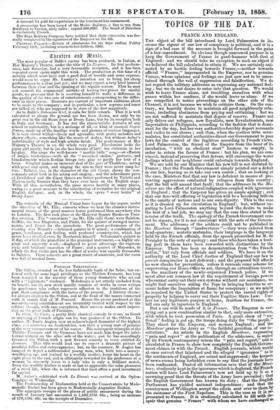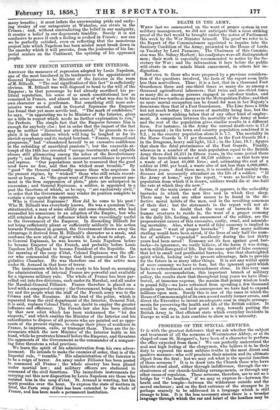TOPICS OF THE DAY.
FRANCE AND ENGLAND.
THE object of the bill introduced by Lord Palmerston to in- crease the rigour of our law of conspiracy is political, and it is a sign of a bad case if the measure is brought forward in the guise of a law-amendment. Its obvious though unavowed purpose is to keep the Government of France in good-humour with that of England : and we should take no exception to such an object if we believed the bill calculated to attain it. We are certainly ani- mated by no hostile feeling towards France,—neither towards official France,." impersonated in the Emperor, nor to genuine France, whose opinions and. feelings are iust now not to be ascer- tained 'through the veil of suppression and falsification. We do not regard the military addresses as expressing any national feel- ing ; but we do not desire to enter into that question. We would wish to leave France alone, not troubling ourselves with what passes within her confines, if she would leave us alone. If we are compelled to notice proceedings on the other side of the Channel, it is not because we wish to criticize them. On the con- trary, we heartily desire to maintain all good neighbourly rela- tions, including abstinence from prying and criticizing) but we are not suffered to maintain that degree of reserve. France not only drives out refugees, now Royalists, now Revolutionists, now Imperialists or Philippists, according to the fashion that is domi- nant for the day, but her very authorities forcibly deport recusants and exiles to our shores ; and then, when the restless tribe accu- mulates, her constituted. authorities direct our-Government to pass laws for the control of the fugitives according to French views. Lord Palmerston, the friend of the Empire from the hour of its incubation, " with an obedient start" hastens to comply, in order to retain the favour of France : but his plan, we are con- vinced, instead of preserving that favour, will encourage the worst feelings which our neighbour could entertain towards England. We are told by our Minister that his new bill is not dictated by France ; that the French Government 'simply pointed out a defect in our law, leaving us to take our own course ; that on looking at the ease, Ministers find that our law is deficient in means of pre- venting aggressions conducted. by refugees from this country ; that the bill will amend that fault ; that the addresses in the Mo- niteur are the effect of natural indignation coupled with ignorance of England ; that the Emperor has given an ample apology ; and that our free-will offering of legislation will be a becoming tribate to the comity of nations and to our own dignity. This is the case as it is dressed up for circulation in England; but, without im- puting to Lord Palmerston anything beyond the desire to make the best of a bad job, we may say that the case thus stated is the reverse of the truth. The apology of the French Government can- not be sincere, for it is not consistent with the acts of the Govern- ment. The addresses of the soldiers could not be published in the Moniteur through " inadvertence "—they were ordered from head-quarters ; mutatis rautandis, their language is the language held by the French officials, from the speech prescribed for M. de Persigny to the note of apology ; and those who have taken a lead- ing part in them have been rewarded with distinctions by the Emperor. There has been no demonstration from " the French nation," but only from officials and soldiers. We have it on the authority of the Lord Chief Justice of England that our law to punish conspiracies is not deficient ; and the proposed bill affords no new checks for prevention, unless it conceals some scheme for empowering our Home Office to act, through an extradition treaty, as the auxiliary of the newly-organized French police. If we must alter our common law at the requirement of foreign powers who cannot carry out their own systems without our assistance, we might find ourselves aiding the Pope in bringing heretics to ac- count before the Inquisition at Rome for conspiracy ; or we might be required by the United States to protect the sacred rights of property by helping to carry out their Fugitive Slave Law. Use- less for any legitimate purpose at home, fruitless for France, the bill can only be injurious to England. But a use will be made of it in France. The Emperor is car- rying out a new combination similar to that, only more extensive, with which he took possession of Paris. A great show of "na- tional" feeling is got up, the troops doing duty for "the people." They shout for the Emperor, and menace England ; and the Moniteur praises the Army as " the faithful guardian of Our in- stitutions." An article in the English Moniteur, expressing "pain and regret" at the publication of the addresses, is copied by its French contemporary minus the " pain and regret," and is circulated in France to show how completely the English Govern- ment chimes in with the French. English journals, which would at once correct that falsehood. and the alleged. " ignorance as te the sentiments of England, are seized and suppressed ; the keepers of news-rooms being forbidden even to say that the journals have been confiscated. Denied all information save that of the. Mani- teu r, studiously kept in the ignorance which is deplored, wrench nation will have Lord Palmerston's new act held up to it as a crowning proof that the threats of the Army have prevailed ; that the English Government has known its duty ; that the English Parliament has yielded national independence ; and that the countrymen of Wellington accept the edicts sent over to them by the successor of the First Napoleon. This is the case as it is re- presented to France. It is studiously calculated to fill with de- spair that genuine "France" with whom we have exchanged s°
many benefits ; it must inflate the overweening pride and undy- ing rivalry of our antagonists at Waterloo, our rivals in the Crimea; and, without contradicting the belief in our malignity, it creates a belief in our degenerate timidity. Surely it is not conducive to peace if such a feeling is evoked. in France ; nor can we be perfectly satisfied, even on reflecting that the monstrous project into which Napoleon has been misled must break down in the anarchy which it will provoke, from the jealousies of his Im- perial seniors on the Continent, the uprising of his oppressed people.



























 Previous page
Previous page